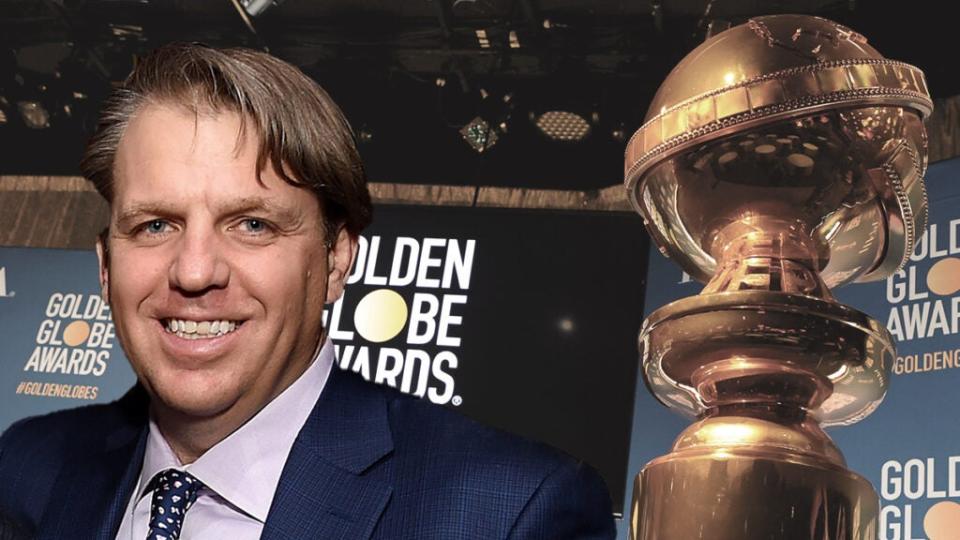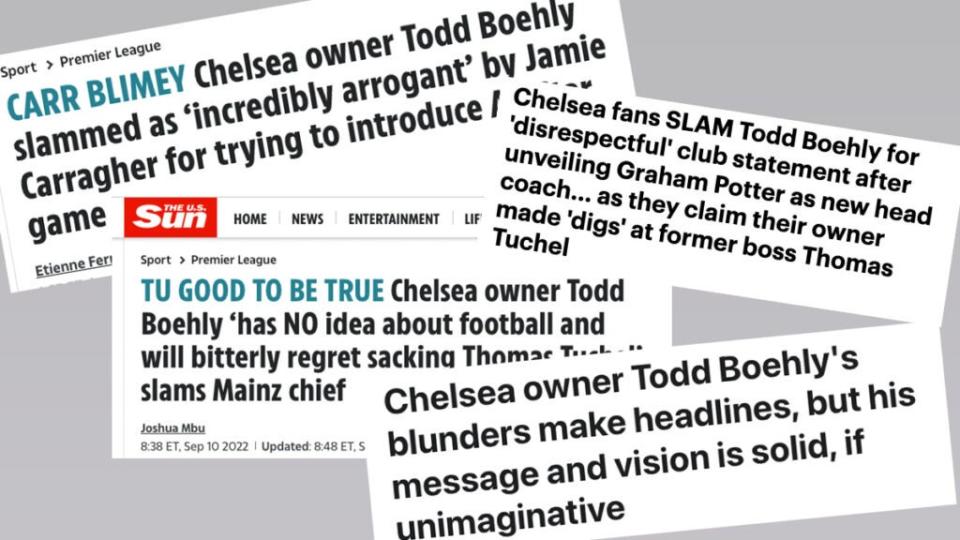Todd Boehly, Hollywood’s Quietest Investor, Faces Spotlight After Golden Globes, Chelsea Soccer Deals
- Oops!Something went wrong.Please try again later.
Just months ago, Todd Boehly was basking in the glory of clinching two massive vanity acquisitions in a row: First he pulled off a $5.4 billion takeover of England’s Chelsea Football Club and then snapped up Hollywood’s Golden Globe Awards for no money at all.
Both seemed a surefire bet for the billionaire financier to gain international recognition, holding court in the owner’s box at London’s legendary Stamford Bridge stadium and taking his place as a Tinseltown kingmaker. These weren’t passive investments. Boehly took on a very public profile — unlike his other holdings in media, technology, real estate and insurance.
The 49-year-old fund management owner has made no secret of his ambition to use the Golden Globes and Chelsea FC as vehicles to spawn even more deals on both sides of the pond. The trouble is he might not have been prepared for the spotlight that comes with such high-profile properties. He’s become fodder for London’s notoriously aggressive tabloids as an American meddling with a beloved British institution. And the entertainment industry hasn’t exactly welcomed his style of management, with powerful Hollywood publicists expressing a lack of confidence in his ability to build more inclusion into the scandal-tarnished awards show.
“He has spread himself way too thin,” one investment banker who has been on the opposite side of dealmaking with Boehly told TheWrap. “He’s obviously extremely successful as an investor, but may have bit off more than he could chew with two major deals that need a ton of nonstop attention.”
Also Read:
Golden Globes Are Back on NBC – But Stars Are ‘Cautiously Assessing’ Whether They’ll Return
Boehly’s business empire is now enormous, and his dealmaking has him jetting between Los Angeles, New York and London, where he has been attending most of Chelsea’s matches. That’s in addition to an already formidable $32 billion investment portfolio managed through his Eldridge Industries holding company, which owns stakes in the Los Angeles Dodgers and Lakers, the song catalog of Bruce Springsteen, Epic Games, and entertainment brands like Golden Globes’ producer Dick Clark Productions, MRC, A24 and Fullwell Productions. In all, Boehly has stakes in more than 100 companies and business brand names.
To be sure, Boehly is known in the hypercompetitive financial world as a “quiet force of nature,” according to more than one person who has worked with him. He’s not known to be flashy or gregarious, but has developed an image as a relentless dealmaker working mostly behind the scenes over his 25-year career.
“I don’t look at him as on the ropes,” said Joe Ravitch, co-founder of merchant bank Raine Group, which was put in charge of managing bidders for Chelsea when Russian oligarch Roman Abramovich was forced to sell the team after his homeland invaded Ukraine.
“He has an organization of very smart people, but at the end of the day he makes the decisions himself, he shows up, and he knows every detail. If you look back at the Chelsea deal, we wanted someone who would make the right commitment. He was very convincing about that.”
There were widespread reports across Europe and the U.S. that Boehly’s consortium of investors outbid all of their rivals with a cash-heavy offer. Even so, Abramovich “tried not to sell the team to Boehly,” one entertainment industry executive with knowledge of the deal process said. “Todd’s offer was so much richer than anyone else’s that he had to.”

How did Todd Boehly get so rich?
He grew up in Bethesda, Maryland, where he graduated from the private Landon Academy, and then earned an undergraduate degree in business administration from William & Mary College. He then picked up a degree in finance from the London School of Economics, where he first fell in love with the British metropolis.
Boehly launched a career in investment banking, starting in 1996 working for Credit Suisse in New York and the venture capital firm JH Whitney & Co. just as tech stocks went gangbusters. His jump to the financial services giant Guggenheim Partners in 2001 catapulted him into the big leagues, as he worked alongside chief executive Mark Walter to build a credit management business. Boehly quickly became one of Wall Street’s top advisers, helping clients steer clear of fraudulent companies like Enron whose collapse shuddered markets.
Bohely’s tenacity may be best summed up by an anecdote passed around among bankers and hedge fund managers: When Walter dispatched him to Topeka, Kansas, to kick the tires on buying Security Benefit Life Insurance, Boehly didn’t like the fact his hotel room smelled like cigarette smoke, so he slept on a park bench before his meetings, according to U.K.’s Telegraph. Guggenheim later bought the company for $400 million in 2010.
Walter’s mentorship made both men among Forbes’ 400 Richest Americans list, and gave Boehly the capital to create Eldridge in 2015, taking along the cash cow, Security Benefit, and other assets, such as the media group that controlled The Hollywood Reporter and Billboard magazines. Walter and Boehly also continue to invest together, including cross-holdings in Chelsea FC and the Dodgers.
Security Benefit, a life insurance behemoth whose origins date back to 1891, is the motherlode of Boehly’s ocean of investment cash. The privately owned company has $50 billion in assets under management from the fixed annuities and mutual funds of its enormous, retirement-age clientele.
That asset alone is enough to make up for any number of investment mistakes, including the consortium of THR, Billboard and several other media trades bought in 2009. Throughout a decade of Guggenheim and then Eldridge ownership, The Reporter lost tens of millions of dollars annually as the owners tried to turn around the legacy trade. After failing to find a path to profitability or even break even with the added blow of the COVID pandemic, Boehly finally struck a deal with Jay Penske in September 2020 to essentially give him the asset to manage, at a value of $100 million.
Boehly, who didn’t return requests for comment through a spokesman, once summed up his career with a mantra: “If I said I was going to do it, I’d get it done. And when you have a reputation for being able to get stuff done, it’s amazing what stuff ends up piling up in your inbox.”
But his inbox may be a little too stuffed these days. And this hasn’t burnished his reputation in Hollywood.
“He begged for a meeting with me,” said one leading studio awards executive who met with Boehly when he was trying to buy the Golden Globes and turn the nonprofit Hollywood Foreign Press Association into a for-profit company. “And then he was just flipping through his phone… He’s like any other rich guy: short attention span.”
Also Read:
MRC Parts Ways With Todd Boehly’s Eldridge and PMRC
Other executives in both Hollywood and London reported similar instances when Boehly seemed to focus more on reading his emails than engaging in meetings in the present. Sometimes he cuts scheduled encounters short or just fails to show up. “He just seemed so deeply disengaged during a meeting that he made senior government leaders attend,” one U.K. lawmaker said. “And then turned what was scheduled for an hour into a game of speed dating. It was over in 20 minutes.”
Being more present was certainly called for during the delicate talks to acquire the Golden Globes from the embattled HFPA after a Los Angeles Times exposé on the organization’s entrenched corruption and lack of Black members. Tom Cruise returned his three Golden Globe trophies after more than 100 publicity executives launched a boycott, and NBC canceled the 2022 awards telecast.
Boehly has faced added scrutiny for transforming the HFPA into a for-profit entity in a deal that allows Eldridge to maintain the tens of millions of revenue the show produces for his Dick Clark Productions. Eldridge has floated the idea of expanding the awards show overseas, adding even more opportunity to make money. Despite the ongoing controversy, NBC has agreed to bring the show back on air this January — albeit for just a one-year contract.
Much of Hollywood’s consternation about Boehly’s financial maneuvering has been under-covered by Hollywood’s trade press for one simple reason — he owns them through his $100 million deal in 2020 that merged his ownership in The Hollywood Reporter, Billboard and other titles into fellow billionaire Penske’s media empire that includes Variety and Rolling Stone. Others in the group include digital newsroom Deadline.

But he’s not getting off so easy in Europe.
There’s not a day that goes by where Boehly’s name isn’t part of a headline in at least one British newspaper, and they are seldom flattering. “Chelsea Fans SLAM Todd Boehly,” starts one headline in The Daily Mail, while another in The Mirror begins “Todd Boehly Blasted.” Though he did get somewhat of a defense from this ESPN headline: “Chelsea owner Todd Boehly’s blunders make headlines, but his message and vision is solid, if unimaginative.”
Some of the blunders just come from being an American who has been quite open about his Ted Lasso-like lack of knowledge about the game. Boehly has mispronounced names of football academies and players. Early on, the sacking of Chelsea manager Thomas Tuchel riled up fans and the U.K. press — but it didn’t end there.
Boehly’s half-hour speaking spot at September’s SALT conference, put on by investment management firm SkyBridge Capital, triggered widespread condemnation from the U.K., Europe and football supporters alike. “I hope the Premiere League takes a little bit of a lesson from American sports,” he said before going on to describe how he wants to create U.S.-style publicity matches like all-star games.
“It’s like when I went over to America and lectured about guns, this is a bit like lecturing us all about football,” said Piers Morgan, a former CNN host and soccer commentator in the U.K. “A massive number of Brits are asking, ‘Why is he telling us how to play our game?'”
Morgan, who will be a commentator for Fox on this year’s World Cup, added that Boehly misunderstood what British football is like. “It’s not like America where it’s half sports and half entertainment. No fan goes to a match thinking this is showbiz, because it’s a tribal experience where victory is all that matters. There’s a cultural difference and he misread the room.”
But one executive inside Boehly’s inner circle begs to differ: “Chelsea hasn’t lost a match since Todd switched coaches and the Golden Globes are back on NBC. That’s not exactly a bad record.”
But there’s one room Boehly hasn’t misread — the swanky Italian eatery Polpo in Greenwich, Connecticut, which has become a regular spot for Wall Street elite, politicians and celebrities. Boehly owns homes in Connecticut, Los Angeles and London.
Boehly is a regular at the restaurant along with the likes of everyone from former President Bill Clinton to TV personalities like Judge Judy Sheindlin. It’s where dealmaking gets done between bites of veal saltimbocca and penne arrabbiata con salsiccia. One night at Polpo in 2020, billionaire Steve Cohen sought advice from the Dodgers co-owner when he was trying to buy the New York Mets.
“Hollywood might not be his environment and London’s sports circles might not be his environment,” said one Polpo patron who has dined with Boehly there a number of times. “For guys like Todd, this is their environment.”
Sharon Waxman contributed reporting to this story.
Also Read:
Golden Globes Are Back on NBC – But Stars Are ‘Cautiously Assessing’ Whether They’ll Return

